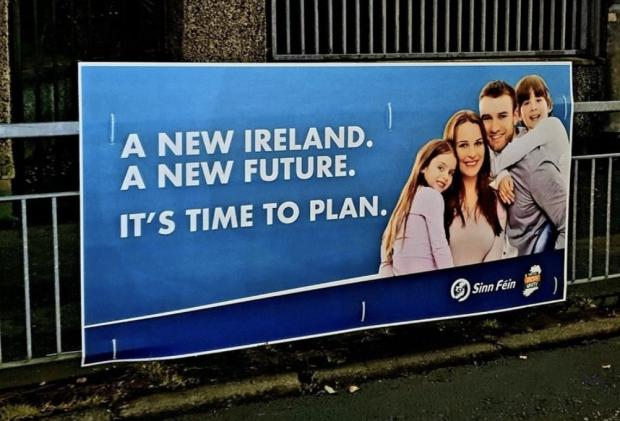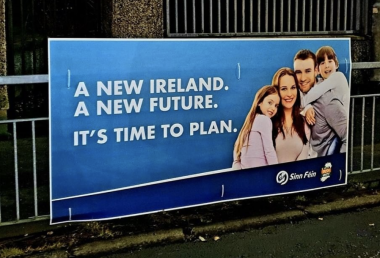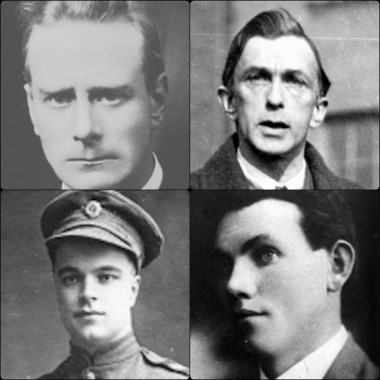11 December 2020
‘History wars’ deflect from national reconciliation & Irish unity – Declan Kearney

"The time has finally arrived to begin an inclusive, democratic discussion about managing a transition towards a new agreed constitutional settlement in Ireland. A new Ireland agreed by the people of Ireland"
There has been an outburst of feigned outrage and hypocrisy during the last two weeks about IRA actions in the past, including recent phases of our history. This is driven by political agendas which often attract uncritical media commentary.
The prospect of Sinn Féin going into government in the southern state has been part of this. But, our Party’s ongoing challenge to partition and its consequences is the major determinant.
Only one purpose is served by the fallout from these ‘history wars’; and that is to deflect public discourse away from discussing the future, the reality of successive English governments’ policy in Ireland, its consequences, and the growing momentum for change, including Irish unity.
Some have tried to take us all down a rabbit hole, by trying to elevate a narrative that Sinn Féin craves historical legitimacy for the IRA in modern times by drawing an equivalence with the IRA formed after the Easter Rising in 1916.
There is no equivalence between the violence of the oppressor and the violence of the oppressed.
But this does not matter one bit to the victims of political violence, whatever its source.
People will form their own conclusions about the IRA’s history and its past and recent campaigns.
People will also draw their own conclusions about British state violence in Ireland leading up to the violent imposition of partition, and the violence of the new Free State government led by WT Cosgrave in support of partition.
The fact is that the war in the north is long since over.
The IRA ceased armed actions in July 1997, and then formally announced an end of its campaign in July 2005.
That was over 15 years ago.

The critical, objective and historical reality which the Irish and British establishments, consistently choose to ignore is that ongoing conflict grew directly out of the English policy which divided Ireland and led to an emergent apartheid state in the six north - eastern counties of Ireland.
The Government of Ireland Act and partition, further entrenched sectarianism, discrimination, inequality, and the repression of republicans, nationalists, Catholics, and, other political dissenters.
Described as the ‘Orange State’ it was impervious to even modest reforms. In 1963 the existing legislation there attracted the expressed envy of the South African Minister, BJ Vorster, such was the battery of repressive laws at its disposal.
A tipping point was then reached when the popular campaign for civil rights was beaten off the streets and roads across the north, and when sectarian pogroms were launched against catholic families during 1969, in Belfast, supported by state militias.
These were the conditions which caused the IRA’s re-emergence in 1969-70 from its dormancy.
The IRA’s capacity and resilience could, and would, not have been sustained without significant support in the north, the southern border counties, and indeed throughout Ireland.
It is simply erroneous to draw conclusions about support for the IRA in the 26 counties by attempting a correlation with the low base of electoral support for Sinn Féin during the 1970’s, ‘80’s and ‘90’s.
English interference and the outcome of partition is the central and enduring fault line at the heart of Irish society and politics. It continues to overshadow present day events, and remains, “the never-failing source of all our political evils”; to quote from Theobald Wolfe Tone in 1791.
In contemporary terms the outworking of Brexit is a direct by-product of partition.
Our most recent experience of political conflict in Ireland was outcome of British state policy.
That was only addressed effectively through the painstaking development of the Irish peace process and signing of the Good Friday Agreement (GFA) in 1998, as an internationally binding peace settlement, which drew a line under political violence in Ireland.
Implementation of that Agreement remains a work in progress. The Irish government is formally obliged as a co guarantor to ensure this is done.
.jpg)
And, be in no doubt, the IRA played its own role in helping to build the peace process and other important foundations for a durable peace.
But the roots of this IRA campaign, originate with English policy: That is, in the violent imposition of partition in 1921-22.
Indeed, the IRA may not have re-emerged as a major political force in modern day Ireland, if republican leaders during that period, who were predecessors of the current Fine Gael and Fianna Fáil leaderships had adopted different strategies and decisions. Yes, those parties have histories too.
Perhaps if different political conditions had existed then, our subsequent history might have been different.
However, that was not to be, and all of Irish society, north and south, has lived with the legacy of imposed partition ever since.
The truth is that the denial of Irish national democracy then sowed the seeds of political conflict until another way was established to provide a peaceful way towards achieving the legitimate, democratic objective of Irish unity, through full national self-determination by the people of Ireland.
Those who denigrate the IRA of the latter day, do so without regard for the political circumstances and actual popular support which sustained its previous campaign.
Any assessment of the most recent political conflict which ignores these realities is flawed or biased.
Of course, it is a party-political choice and policy to support and maintain the status quo, and also oppose constitutional change in Ireland.
But the GFA properly and democratically accords that choice to the people of Ireland. This must now be given effect through a unity referendum under the terms of the Agreement.
Partition has had a profound effect upon a political class in the 26 counties, which shows no ambition to achieve Irish unity, or a desire to bring about a real transformation in Irish society. Of course, both James Connolly and Liam Mellows predicted as much.
The past in Ireland is contested because the future, and what shape it will take, is itself contested.
The emergence of Sinn Féin as the largest political party in the country has brought this contradiction sharply into focus.
Sinn Féin, and the newly emergent political and civic debate on Irish unity, are anathema to those political forces and class interests invested in maintaining the status quo in Ireland.

The truth is no reasonable person, republican or otherwise, would seek to glorify the consequences of the most recent period of violent conflict, or any previous phase of armed struggle.
The violence of our collective past throughout Irish history caused massive hurt and suffering on all sides, and by all sides; including combatants and non-combatants, and all their families.
There was no such thing as a ‘good old IRA’.
Acts of war and violence cannot be romanticised. The large operations by the IRA on the morning of 21st November 1920 in Dublin, and one week later at Kilmichael, resulted in huge loss of human life and injury.
It would be wrongheaded not to acknowledge that much has happened in Ireland’s history, and about which there are things, and on all sides, to be deeply regretted. How could it be otherwise?
The loss of life is an awful thing and never to be celebrated.
With the benefit of historical hindsight, we can all see things which we wish we had been done differently or not at all.
However, embracing that reality does not mean that we can or should forget the past.
The peace process points us all towards the importance of dialogue about how to live with the past; and how we should remember and commemorate our family, friends and comrades, with respect and sensitivity - mindful always of the loss of others.
This unfinished work of the peace process, underlines the need to open up a new phase, based upon reconciliation and healing.
Almost 100 years ago the English King George V offered the following sentiments during his visit to Belfast:
“I speak from a full heart when I pray that my coming to Ireland today may prove to be the first step towards the end of strife amongst her people, whatever their race or creed. In that hope, I appeal to all Irishmen to pause, to stretch out the hand of forbearance and conciliation, to forgive and to forget, and to join in making for the land which they have a new era of peace, contentment, and goodwill.”
We all have a part to play in developing reconciliation as Irish society moves through this decade of centenaries, and particularly as new, deeply challenging centenaries approach.
This article was authored on 8th December, and the 98th anniversary marking the executions of Joe Mc Kelvey, Rory O Connor, Liam Mellows and Dick Barrett by the new Irish Free State Government in 1922.

- Liam Mellows, Rory O'Connor, Joseph McKelvey and Richard Barrett
By that time the Irish civil war was underway.
Within three months of those executions, five members of Free State forces were simultaneously blown up in Knocknagoshel, Co Kerry on 6th March 1923.
The next day, not far away, nine IRA volunteers were tied to a landmine at Ballyseedy, which was then detonated by Free State soldiers and eight republicans were killed.
These events, and others, exemplify the brutality of the civil war between 1922 - 23.
In total, 81 official executions of IRA prisoners were carried out by Cosgrave’s government during the civil war.
Then during the 1940’s the Fianna Fáil government carried out official executions of a further six IRA volunteers.
Many dark, violent episodes overshadow modern Irish history and have shaped the contours of present-day politics.
Next year will represent the centenary of England’s partition of Ireland.
For sections of unionism this will be an occasion for celebration.
Republicans, nationalists, and progressives will have a different critique.
2021 holds within it all the potential for a year of discord and greater division.
But, Irish republicans, in the tradition of the United Irishmen and women, should look beyond that paradigm.
We must be thoughtful and generous and popularise a new vision for all our people.
The only antidote to Ireland’s historic disagreement and pain, is by proving that a better future is possible.
A national and democratic alternative does exist; one decided solely by the people of Ireland.
It would seem to suit those opposed to the ongoing democratic transformation of Ireland, to try and keep our society trapped in the past - by using their ‘history wars’ to create distractions and perpetuate division.
However, constitutional change is in the air.
Reconciliation in Ireland and reunification are inseparable.
The time has finally arrived to begin an inclusive, democratic discussion about managing a transition towards a new agreed constitutional settlement in Ireland. A new Ireland agreed by the people of Ireland.
As 2020 draws to a close, Sinn Féin urges all sections of Irish civic and political opinion, both north and south, and beyond, to engage with each other on how such a dialogue can be progressed.
Follow us on Facebook
An Phoblacht on Twitter
Uncomfortable Conversations

An initiative for dialogue
for reconciliation
— — — — — — —
Contributions from key figures in the churches, academia and wider civic society as well as senior republican figures





